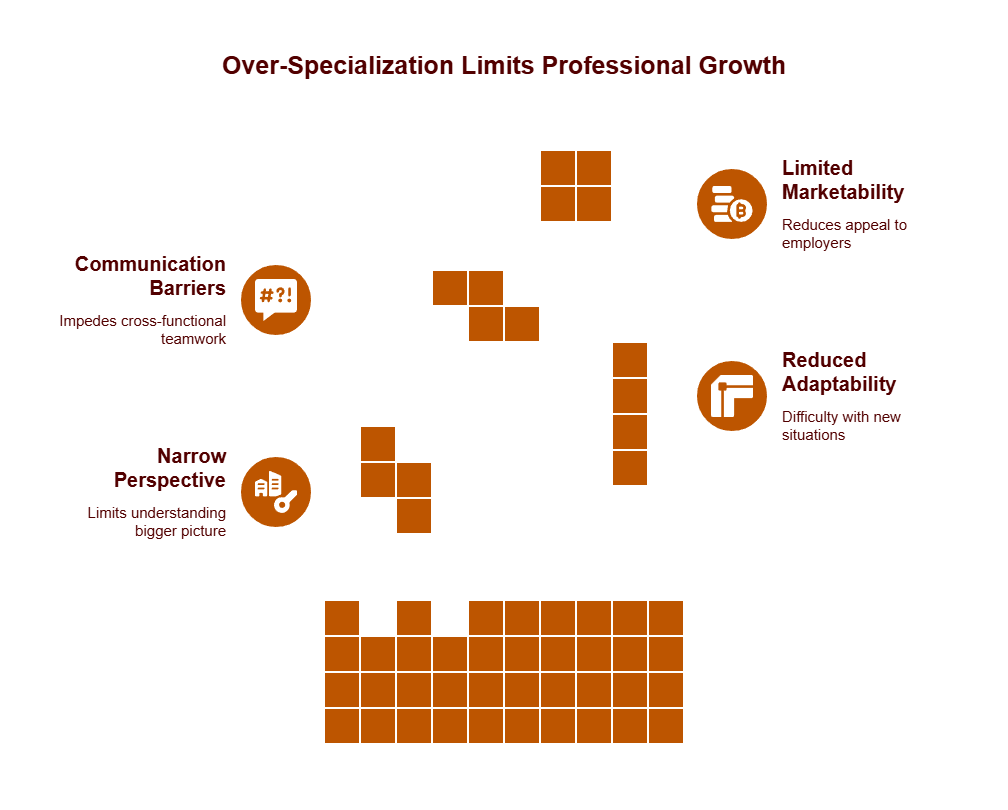
Why Most Software Developers Fail at Career Growth (And How to Fix It)
Problem-solving skills are the heart of successful software developer career paths, yet there’s a concerning talent gap in this crucial ability. After years of building tech teams and mentoring developers at CyberMedics, I’ve noticed a pattern: most software engineers who stall in their careers aren’t lacking technical knowledge—they’re missing fundamental problem-solving capabilities.
While many developers obsess over the latest programming languages or frameworks, becoming a great software developer actually hinges more on mastering algorithms and problem-solving approaches. In fact, a 2025 industry skills report lists communication, problem-solving, adaptability, and teamwork among the top abilities for developers. These software engineer skills aren’t just nice-to-have additions—they’re essential for delivering real value. As Albert Einstein reportedly said, “If I had an hour to solve a problem, I’d spend 55 minutes thinking about the problem and 5 minutes thinking about solutions”. This approach highlights what I consider the critical difference between developers who advance and those who stagnate.
Throughout this article, I’ll explore why many talented developers fail to progress in their careers and how shifting focus from specific technologies to problem-solving can transform their growth trajectories. We’ll examine the common pitfalls that limit potential and the practical steps you can take to become the kind of developer who stands out in today’s competitive landscape.
Focusing Too Much on Tools and Frameworks
Many developers begin their software developer career paths with an intense focus on mastering specific technologies. They proudly list React, Node.js, or Python on their resumes, believing these tools define their value. Nevertheless, this approach fundamentally misunderstands what drives long-term success.
Why mastering tech stacks isn’t enough
In our fast-paced tech world, it’s tempting to get caught up in the latest programming languages and cutting-edge technologies. However, programming languages and frameworks are merely tools, similar to those used in architecture, construction or other engineering fields. Their selection often depends on the team you’re working with, organizational tech stack, or company policies.
What truly matters is developing an engineering approach that transcends specific tools. During my years building teams, I’ve consistently seen that understanding design patterns, software architecture, and system components creates more valuable engineers than those who’ve memorized every React hook.
Don’t get hung up on specific technologies
I don’t believe every good engineer must know multiple programming languages. For years, we’ve heard: “Learn as many languages as possible,” but I’ve seen developers master one language, explore its depths, and solve problems more effectively than those superficially familiar with many.
The core principles of computer science—algorithms, data structures, and design patterns—remain relatively stable over time. Subsequently, when you grasp these fundamentals, you can adapt to any technology stack. Consider this: while JavaScript frameworks like React and Angular come and go, the underlying principles of DOM manipulation persist.
How over-specialization limits growth
One of the greatest risks of specializing in a single sector is knowledge obsolescence. Furthermore, focusing solely on one area reduces available opportunities, especially during economic downturns in that sector.

Over-specialization creates several career limitations:
- It narrows your perspective, making it difficult to understand the bigger picture
- It reduces adaptability to new situations or technologies
- It creates communication barriers with colleagues having different skill sets
- It can limit your marketability to employers seeking well-rounded candidates
The tech industry increasingly values software engineers who can communicate effectively, adapt to change, and solve problems efficiently. With AI taking on more automated areas, it’s more important than ever for software developers to cultivate distinctly human skills—adaptability, creativity, and problem-solving that extends beyond specific tools.
Remember, what truly matters is understanding the intricacies of the engineering you’re doing. Technical breadth opens doors to architect-like roles where your diverse knowledge is most appreciated.
Starting With Code Instead of the Problem
Throughout my years of working with tech teams at CyberMedics, I’ve seen a pattern among developers who struggle to advance: they rush to code before truly understanding what needs to be solved. This approach is like trying to build a house without blueprints—you might end up with walls and a roof, yet miss the mark completely on what the homeowner needed.
Start with the problem, not the code
Problem-solving is the meta-skill in software development—the foundation upon which successful software developer career paths are built. Indeed, when faced with a challenge, many developers immediately open their code editor and start typing. This approach fundamentally misunderstands the development process.
Before writing a single line of code, I encourage my team to ask critical questions: “Is the answer something I can find in documentation, or does it require a business decision? Am I trying to figure out what to do, or how to do what’s been decided? Whose input do I need to move forward?”
Essentially, developers need to identify when a problem transitions from a technical challenge to a business decision. Throughout my career, I’ve found that the most successful engineers follow the aforementioned Einstein approach: spend most of their time thinking about the problem rather than rushing toward solutions.
Understanding user needs before writing logic
User-centered design (UCD) places users at the forefront of development, prioritizing their needs throughout every stage. Initially, this might seem counterintuitive to code-focused developers, yet it’s precisely what distinguishes exceptional software engineers.
In UCD, teams involve users via various research techniques to create highly usable products. For instance, Google Maps’ development team spent considerable time understanding user needs before designing their interface. Rather than simply coding features, they focused on creating solutions that even “your tech-challenged aunt could navigate”.
This approach pays off in multiple ways: products meet user expectations more effectively, systems become safer with reduced human error, and developers develop deeper empathy with users.
What problems do software engineers solve?
Software engineers primarily solve these types of challenges:
- Bridging gaps – connecting people to services across geographical divides in healthcare and education
- Optimizing processes – making existing systems more efficient and user-friendly
- Creating solutions to complex domain-specific problems that require deep understanding
- Building systems that integrate disparate data sources and technologies
The development of problem-solving skills represents the cornerstone of advancing in software engineering. Consequently, employers consistently prioritize these abilities above specific programming language proficiency. Through my experience mentoring developers, I’ve found that those who grasp this principle advance their software developer career paths more rapidly than those fixated on coding techniques alone.
Building Features Instead of Systems
One significant difference I’ve observed between junior and senior developers is their approach to solution design. Newer developers often focus solely on building individual features, whereas experienced engineers think in terms of entire systems.
Build systems, not features
Feature-oriented development certainly has its place—it helps deliver client-valued outputs quickly, often within 2-10 days. Yet, this approach alone isn’t enough to advance your software developer career path. Although features satisfy immediate needs, systems create lasting value.
Systems thinking requires understanding how components interact rather than viewing them in isolation. Your code becomes part of a larger ecosystem—both technical and social—where relationships between elements determine overall success.
Why scalable thinking matters in career growth
Strategic thinking is a mental muscle that anyone can develop. By shifting from feature-centric to system-level thinking, you gain several career advantages:
- Your solutions withstand growth—preventing expensive rewrites when traffic spikes unexpectedly
- You build more reliable products—ensuring 99.9%+ uptime
- You enable faster feature development through well-designed architectures
- You develop cross-functional perspective valued in leadership roles
Examples of system-level thinking in real projects
At CyberMedics, I’ve seen system-level thinking transform outcomes. On one project, instead of simply adding requested features, we first created specifications and block diagrams that defined how components would interact. This approach led to a comprehensive solution rather than disconnected functions.
Additionally, when redesigning existing systems, effective engineers analyze the entire platform before making changes—creating specifications for new modules while maintaining compatibility with existing elements.
Ignoring Soft Skills and Impact
According to research by Harvard University, Stanford Research Center, and the Carnegie Foundation, 85% of job success comes from interpersonal skills, yet only 15% comes from technical expertise.
Learn to communicate and collaborate
Software development is fundamentally a collaborative endeavor. Professionals with at least one soft skill get promoted 13% faster than those with technical skills alone. Moreover, effective collaboration creates opportunities for others and enhances the collective growth of teams. As project complexity grows, so does the need for clear communication across technical and non-technical stakeholders.
Measure and reflect on impact
Impact as a software engineer comes from balancing quantity, quality, and importance. Notably, focusing solely on technical growth at the expense of business skills means prioritizing quality over importance. To advance, developers must identify problems that deliver tangible business value.
How poor communication stalls promotions
Poor communication frequently blocks promotions. When developers fail to communicate project surprises or hide key messages with convoluted explanations, they damage their reputation. Likewise, hesitating to give feedback on flawed designs affects the entire team’s success.
The role of feedback in developer growth
Feedback drives continuous improvement. Primarily, it helps clarify understanding, offers new perspectives, corrects course, and ultimately makes both you and your work better. Despite its importance, many engineers struggle with requesting and responding to it effectively.
Conclusion
Throughout my years building teams at CyberMedics, I’ve repeatedly seen the same pattern emerge: exceptional software engineers distinguish themselves through problem-solving abilities rather than technical knowledge alone. This distinction creates the dividing line between developers who advance and those who stagnate.
The path forward requires a fundamental shift in thinking. First, we must recognize that tools and frameworks serve merely as vehicles for solutions—they don’t define our value. Second, problem understanding must precede coding; rushing to implementation without clarity leads to wasted effort and missed opportunities. Third, systems thinking elevates our work beyond isolated features to create sustainable, scalable solutions. Finally, soft skills and measurable impact ultimately determine our career trajectory more than technical expertise ever will.
Career growth demands this holistic approach. Developers who expand beyond their technical comfort zones develop the adaptability needed for leadership roles. They learn to communicate effectively across teams, understand business needs, and deliver solutions that address root problems rather than symptoms. These professionals consequently become invaluable assets regardless of changing technology trends.
At CyberMedics (https://www.cybermedics.com/), we believe great careers start with great thinking — not just great code. We’re always looking for talented developers who share our passion for solving real problems with purpose. If that sounds like you, let’s talk.
If you find yourself hitting a ceiling in your development career, step back and examine whether you’ve fallen into these common traps. Your technical skills undoubtedly matter, but your approach to problems, systems thinking abilities, and interpersonal effectiveness will ultimately determine how far you go. The most successful developers I’ve mentored share one quality above all others—they recognize that software development isn’t about writing code; it’s about solving human problems through technology.
